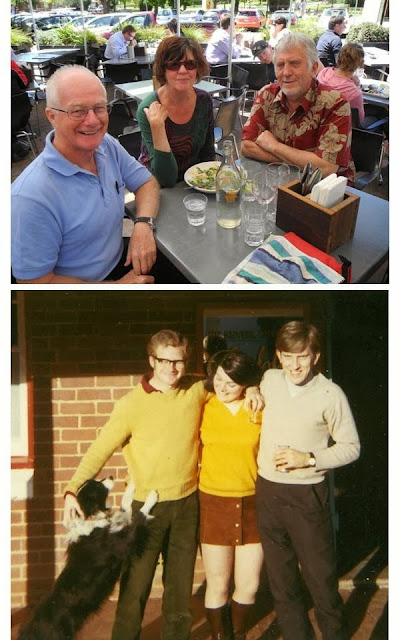WHOSE REVOLUTION?
I was delighted to recover a snap for my family album when I went back to Canberra in October for the Australian National University Golden Alumni Reunion. And I was even videoed by the Canberra Diaspora team which is archiving the now emerging history of the world’s brand newest metro-city:
The video shows a snippet of an interview that I gave about my time in Canberra 1967-1973. It focuses on my discovery of a photograph that had been stapled to display boards in the Common Room at University House. The photo was one of a number that relate to the public demonstrations regarding such issues as the Viet Nam War, the Springbok’s Rugby Tour of Australia, Aboriginal Rights etc.
The photograph in question shows me marching and mooching in a band of bannered students and activists. I was shocked to be confronted with the notion that I had once sported a fringing beard like Van Gogh's Fisherman - and ready to deny that the picture in fact related to me, only to be disabused by contemporaries. Thankfully, the remaining photographs that survive of me in this period show me clean-shaven [see above].
The photograph in question shows me marching and mooching in a band of bannered students and activists. I was shocked to be confronted with the notion that I had once sported a fringing beard like Van Gogh's Fisherman - and ready to deny that the picture in fact related to me, only to be disabused by contemporaries. Thankfully, the remaining photographs that survive of me in this period show me clean-shaven [see above].
The stock of photographs posted in the Common Room had been obtained by Jack Waterford under an Official Information Access request to the Australian Security and Intelligence Organization [ASIO]. Jack was a widely recognized student leader and activist at the time. He later became the Editor of the Canberra Times and still contributes articles to the newspaper. He is also a very wry, witty and provocative public speaker who entertained us Golden Oldies at lunch.
Let me quickly add that I was not an important figure in student politics, though I can still give myself some credit for sticking up for my principles. Notably, I was thrown out of the pub at Mataranka in the Northern Territory for defending government spending on aboriginal development. Arguably, I was much more at risk then than I ever was from the ACT and NSW Police Forces and ASIO.
This morning, I was pushed into writing up my modest contribution to Radical Politics in the 1960s by Dave Armstrong’s article in today’s Dominion Post about ASIO’s ‘Pie and Penthouse’ little sister, New Zealand’s Security Intelligence Service [SIS]. Dave notes that his Dad had be subjected to SIS surveillance and interference in such areas as job applications.
Finally it seems that in 1977, after 35 years of ridiculous surveillance, the SIS declared that Dave’s Dad could be recalssified "current security significance minimal.” I can only assume that one of the Aussie spooks has similarly declared me to be an official security minnow – and, come to think of it, I do seem to get through Aussie Immigration much more quickly nowadays.
Getting back to the Canberra Diaspora interview, my longer spiel in front of the cameras picked up on two hot contemporary topics: the prevalence of widespread social disengagement from politics, and the apparent selfishness, apathy and indifference of a rising majority of young people.
Good copy for future articles when I feel a Statler and Waldorf moment coming on.
Owen is a very Old Mate and he flew down from Darwin from the Reunion. Listen to his delightful story about the Fishy Passenger. Megan on the other hand was one of a band of impressive young women who started with Student Protest and went on to make an enormous contribution in developing Feminist Ideology and Feminist Politics. She was out there in the forefront, as her T-shirt attested.
If Owen and I drew our primary inspiration from Australia’s 19th Century anti-establishment vernacular and traditions, Megan and her colleagues were drawing more innovative and relevant ideas together in organizations like the Women’s Electoral Lobby. It was Banjo Paterson, Henry Lawson and Ned Kelly pitched against Doris Lessing, Gloria Steinem and Germaine Greer - though the sexes found common ground in alcohol and the attraction of opposites.
Hardly surprisingly, the history of the 1960s – 1970s rules in favour of the ladies [or should I say women].



No comments:
Post a Comment